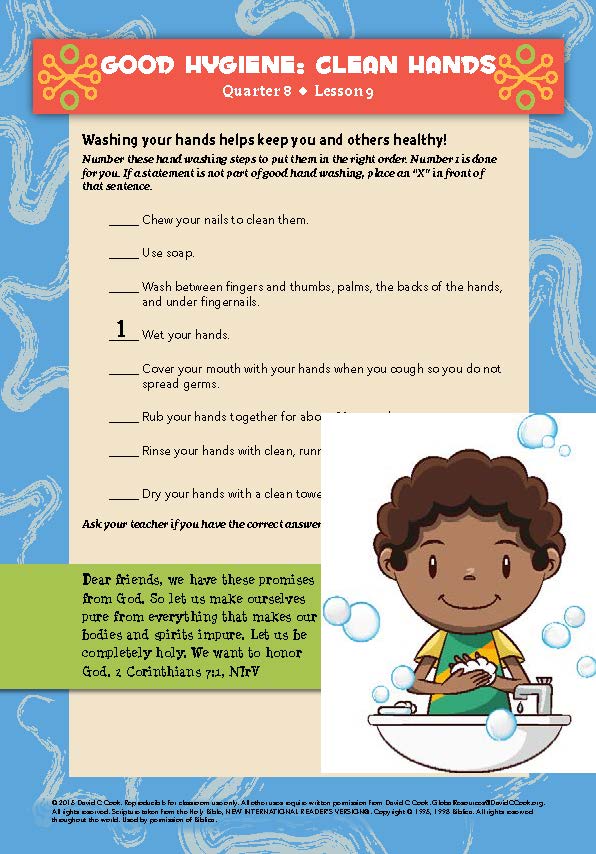During the lesson, the information for you to know is written in regular type, and what we suggest speaking or reading aloud to children is in bold. All resources for this lesson, including the Teacher Guide, Student Page, Family Connection Card, and other resources can be downloaded in a ZIP file by clicking on the following link:
In some lessons you will find "resource articles." These are articles written by experts from around the world to help equip you for your work with children and adolescents. Share them with parents or guardians if you consider it appropriate.
So God created mankind in his own image, in the image of God he created them; male and female he created them.
Genesis 1:27
God created us in His image. He also gave us physical bodies. It is amazing that our holy, powerful God cares about our bodies! Long before doctors knew that the germs on our hands can cause sickness and spread disease, God knew the importance of hand washing. He made us and knows that all of our lives—mind, body, spirit—are made to worship and glorify Him.
Consider things that make your spirit or your body dirty. Rub your hands in some dirt or mud and then wash them clean with soap and water. As you wash them, confess to God ways you have not been clean. Then praise Him for washing your heart as well as your body.
Tell families that this week their children will learn about the importance of hand washing. A good way to remember something is to teach it to someone else. Families can ask their children to teach them what they learned about washing hands.
Teacher Tip: If possible, email or text the Family Connection Card to the families of your students.
Greet your children warmly by name as they arrive. Divide them into pairs. Explain that each person will have 2 minutes to tell his partner a true story called “A Day in the Life of My Hands.” In their stories, they will say what their hands do in a typical day. Their stories can be fun and silly but should be true. Signal after 2 minutes so the other partner can share a story.
Share this example if children need help to understand: “Today, my hands helped pull my shirt over
my head. Then my hands brought food to my mouth. Next my hand picked up a jar and helped me carry water.”
After pairs have told their stories, gather the children back together. Ask a couple of children to
briefly share their stories with the class. You can also tell your own “A Day in the Life of My Hands” story to the children.
Our hands help us do many important things every day! Some of these things cause our hands to get dirty, even if they do not look dirty. Today we will learn why it is important to wash our hands to keep them clean. We will also learn how to wash our hands properly.
For the next few weeks we will learn about how to keep our bodies clean and healthy. This is called personal hygiene. There are good reasons to keep the body clean and healthy.
What are some reasons to keep our bodies clean and healthy?
Allow the children to offer their ideas for a minute or so.
Listen to what the Bible says about our bodies. King David wrote this verse:
Read Psalm 139:14 from your Bible.
If you are using the Memory Verse Poster, show it to the students.
I praise you because I am fearfully and wonderfully made; your works are wonderful, I know that full well.
Psalm 139:14

God made our bodies in a wonderful way! He wants us to care for our bodies. Listen to this verse:
Read 1 Corinthians 6:19–20 aloud.
Do you not know that your bodies are temples of the Holy Spirit, who is in you, whom you have received from God? You are not your own; you were bought at a price. Therefore honor God with your bodies.
1 Corinthians 6:19–20
Because the Holy Spirit lives in believers, when they care for their bodies they honor God. We show honor to God when we stay away from things that will harm our bodies. Learning
how to care for our bodies will help us learn to honor God with them. Even if you are not yet ready to believe in God, He still loves you enough to want you to care for the gift He gave you, your body.
Do the following demonstration for your children. Set out the dirty and clean cups and the jug of water. Show the children the clean cup.
This is my cup. I want you to take care of it for me. I will fill it with water soon.
Hand the clean cup to a child. Show the children the dirty cup.
How do you think I would feel if I returned to get my clean cup and it was dirty like
this one?
Allow the children to respond.
Think about these cups as symbols for our bodies, which God gave us. When we take care of our bodies, we take care of this wonderful gift God gave us. When we do not take care of our bodies, it is like giving back to God the dirty cup rather than the clean one.
Children may answer to stay healthy or to feel better or other things.
Can anyone tell me what germs are?
Allow children to respond before sharing the information below.
Germs are so small that we cannot see them without a microscope. They are so small that millions of germs could fit on the tip of a pen. Germs are everywhere. For example, they are on the ground, on the table, in the street, in houses, and on objects. Some germs are good for us and are used in medicine.
Some germs are bad and make people sick. Germs that make us sick can be found in human and animal faeces or waste, rotten food, uncooked meat, body fluids such as mucus, and unclean water.
When you have a cold, germs blow out when you cough or sneeze. You can use a tissue or clean cloth to stop them from spreading. Or you can use your arm or elbow to cover your mouth or nose when you cough or sneeze. If you used your hands, then your hands would be covered with germs.
When should you wash your hands?
Make sure the children mention the following:
Hands may look clean but can still have germs. Remember, germs are invisible. Now I will show you the proper way to wash your hands. Even if you already know, watch carefully to see if you can learn something new.
You will use a pan of water, soap, and a towel for this demonstration. If you do not have these supplies, pretend to act out washing and drying your hands. Share the following information as you demonstrate each step.
Use just enough water to wet your hands well. Now rub your hands together for about 20 seconds. This is just about as long as it takes to sing “Jesus Loves Me.”
It is important to use soap because it helps prevent germs from sticking to your skin.
Wash your palms, the backs of your hands, between your fingers, and under your fingernails. The tips of nails are dirt traps. We should all try to keep our nails neatly trimmed and never bite them.
Then you rinse your hands with clean, running water. Finally, dry your hands with a clean towel or rag.
Allow the children to practice good hand washing as you go through the steps again. Sing a song that is approximately 20 seconds long while they wash all parts of their hands. Praise them for doing a good job and encourage them to notice how their hands look clean and smell nice. If soap and water are not available, the children can pretend as they go through the motions with you.
Optional Supplies:
Give each child a piece of paper and pencil. Ask the children to draw 2 hands—1 on each side of the paper. Tell them to make the hand on one side look dirty and the hand on the other side look clean.
Have the children use their drawings for the next activity. They will respond to the statements by holding up the dirty or clean hands as their answers.
End of Option
I will read some statements. You will tell me whether my hands are dirty or clean. If my hands are clean, wave your hand. If my hands are dirty, raise a fist showing you would not want to touch my hand.
Answers are provided for you after each statement.
Congratulate the children for their correct answers. If they did not answer correctly, review why your hands were either clean or dirty.
Let’s review what you have learned about hand washing today.
Optional: If you are using the Student Pages, allow the children to do the review on those instead of with the questions below.

Divide the children into 3 groups. Tell the groups they have 5 minutes to come up with a chant to help them remember the steps of good hand washing. After time is up, allow each group to share their chant with the whole class. If any steps are missed, remind the children so they can add them in. Encourage them to remember the chant this week so they can practice good hand washing.
Because God created our bodies, He understands what is healthy for them and what is unhealthy for them. He told His people in the Old Testament instructions about washing hands because He knew that hand washing is an important part of being healthy.
End class by praying this blessing from Psalm 139:14 and 2 Corinthians 7:1 over the children.
Blessing: May you honor God by keeping your hands clean and your body healthy. God wants you to know that He created you wonderfully!
Lead the children in singing this quarter’s song, if possible.
Life on Life ©2020 David C Cook. Reproducible for home or classroom use only. All other uses require written permission from David C Cook [email protected]. All rights reserved.